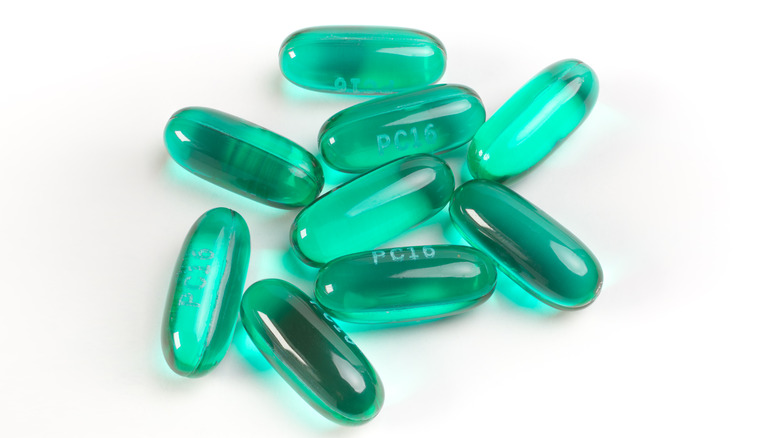Throw Your OTC Medicine Away Immediately If You Notice This
If you want to banish aches and pains fast, a well-stocked medicine cabinet is essential. No one wants to make a quick run to the store when they don't feel well. According to CNN, a well-rounded supply includes over-the-counter (OTC) pain relievers/fever reducers like acetaminophen and ibuprofen, cough medicines, and decongestants. Allergy medicines and antidiarrheals are useful to keep on hand, too. When you're building your supply, consider purchasing at a pharmacy or grocery store. Bulk purchases can leave you with more than you can use. Dollar stores aren't a recommended choice either.
To keep your medicines as long-lasting as possible, think beyond the traditional medicine cabinet. According to Mark Heelon, Medication Safety Officer for Baystate Health, many medicines don't work as well if they are exposed to heat or cold. High humidity and sunlight can affect a medicine's potency, too. MedlinePlus suggests storing medicines in a dresser drawer or closet shelf. Kitchen cabinets are a good choice, too. Avoid hot areas near the stove or wet areas near the sink. If young children are in your home, be sure to keep medicines stored in a high location where they can't be reached by little hands (per KnowYourOTCs).
Even with proper storage, medicines don't last forever. So how do you know when it's time for a refresh?
Check the expiration dates
As required by a 1979 law, a medicine's expiration date is the date up to which the drug's "full potency and safety" is guaranteed. In a U.S. Food and Drug Administration (FDA) study of expired drugs for the military, 90% could be used 15 years beyond the expiration date (per Harvard Health). However, these medicines were stored under "ideal conditions" that could not be duplicated at home (per Winchester Hospital).
When it comes to expired OTC medicines, guidance from the FDA is clear: Toss them. A medicine may be less effective or even risky due to changes over time. Don't add to your suffering.
Parents magazine recommends a monthly check. Look at dates, and examine medicines for changes in texture or smell. Sticky, chipped pills can also indicate damage. Aspirin can break down into vinegar and salicylic acid and irritate your stomach (per MedlinePlus). Err on the side of caution and don't take risks to save a little money. When in doubt, ask a pharmacist.
Once you're identified any expired or damaged medicines, dispose of them properly. The FDA recommends utilizing drug take back locations for both OTC and prescription drugs. You can access local information by visiting the U.S. Drug Enforcement Administration's Take Back Day site. If a take back event is not available, most medicines can be disposed of in the trash. Place old medicines in a sealable bag or container and mix them with old coffee grounds or cat litter (per the FDA).

